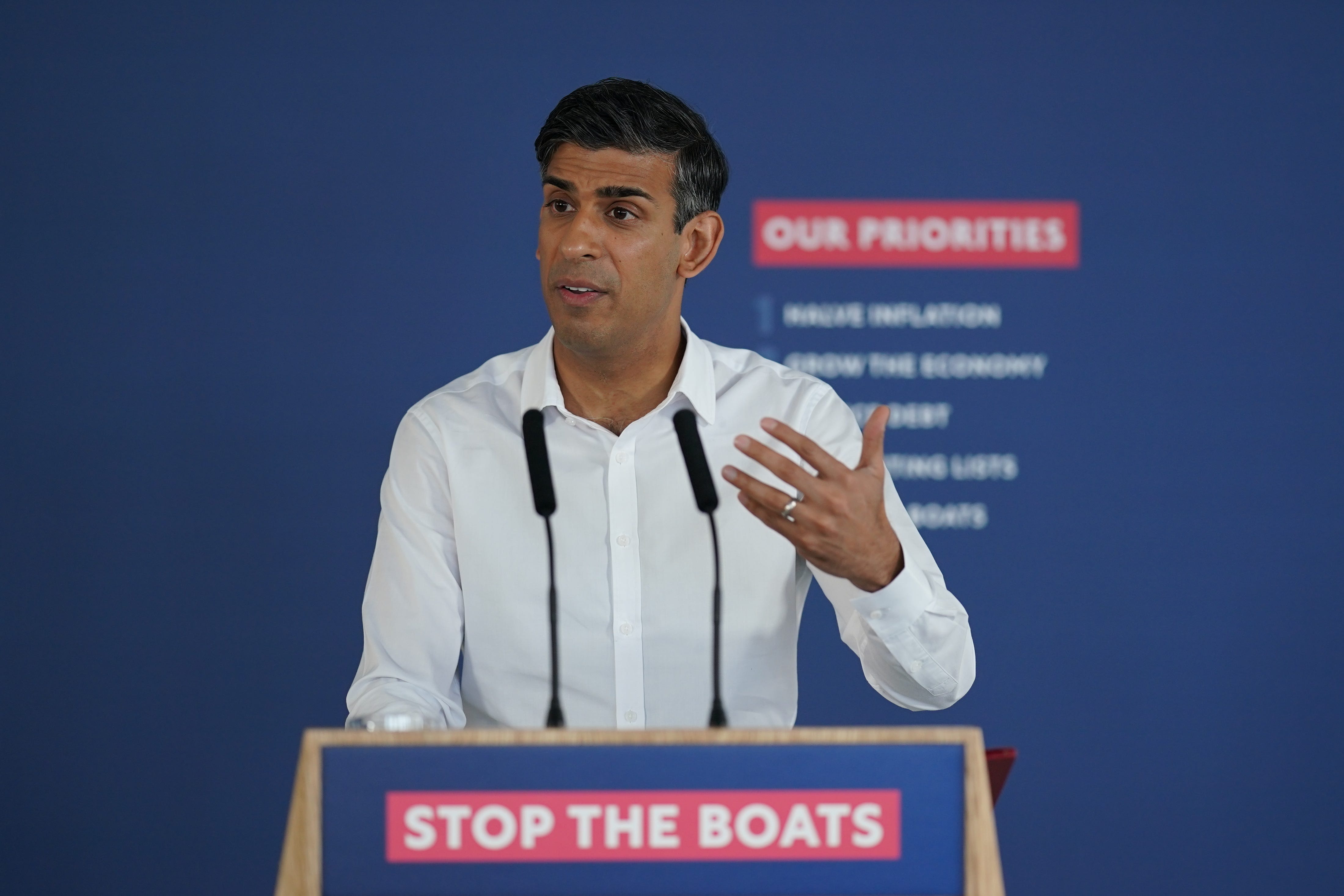How far will the Tory right push Rishi Sunak when it comes to small boats?
Hardliners are clutching at ever more extreme solutions – from forcing back boats to sending people to distant islands. Adam Forrest takes a closer look at what happens next


Rishi Sunak must be wishing he could extend his summer holiday in California and enjoy a few more strolls along the west coast’s serene beaches. Instead, the prime minister is heading into another gloomy storm over the small boats issue as he returns to work on Monday.
The government’s “small boats week” turned from a damp squib into an embarrassing disaster when the Home Office was forced to evacuate the Bibby Stockholm barge on Friday after Legionella bacteria were found in its water supply.
And intense pressure to get to grips with the Channel crossings problem rose to fever pitch after the appalling tragedy on Saturday that saw six people die when a vessel sank off the coast of France.
What should we do now? How much further can we push? These are the questions ministers, Tory MPs and strategists have been asking themselves, as despair sets in over the chances of Sunak getting anywhere close to fulfilling his “stop the boats” pledge before the next election.
Are more barges the answer? Tory hardliners are unapologetic, despite the messy fiasco over safety issues on the Bibby Stockholm and anguish at the “staggering incompetence” of the Home Office (in the words of ex-minister David Davis).
According to reports, officials are still under orders to find more port authorities who are willing to agree to accept container vessels for the purpose of housing asylum seekers. John Hayes, a close ally of home secretary Suella Braverman and the leader of the Conservative Party’s Common Sense Group, has insisted that the use of such barges is still a “great idea”.
Hayes and other leading figures on the Tory right are keen to go further, however. They know that despite the headline-grabbing properties of the barges, these vessels merely allow for a small number of people to be moved out of hotels amid the huge backlog of asylum cases. They hope, however, that the “austere” conditions on board will act as a deterrent.
Some Tory MPs are still clinging to the controversial plan to give failed asylum seekers a one-way ticket to Rwanda. But the Supreme Court may well rule against the policy when the case is heard later this year, with growing despair among supporters of the scheme that the flights will ever take off.
Officials from the Home Office and No 10 steered away last week from the idea of sending people to Ascension Island – a remote British territory 9,000 miles away with no hospital – after it emerged that the proposal had previously been rejected. It is understood to have been raised again by one of Sunak’s ministers, who is said to have asked questions about it in an apparently desperate search for options.
Many now want Sunak to seriously consider pulling the UK out of the European Convention on Human Rights, or at least include this bold proposal in the Tory manifesto for the next election, in a bid to lessen the power of judges in Strasbourg.
But it is by no means certain that taking such a step would stop British judges from ruling against the government. And withdrawing Britain’s subscription to the landmark convention could cause serious headaches in relation to the Good Friday Agreement and the post-Brexit trade deal with the EU.
The most radical idea of all has reared its head again in recent days: the notion of so-called pushbacks. Some are convinced that getting Border Force and the Royal Navy to turn boats round and escort them back to France could prove the most effective way of reducing Channel crossings.
Australia appears to have enjoyed some success from its policy of intercepting boats and guiding them back to safe countries, but this option would be trickier for the British government, as there are no international waters to separate the UK and France in the Channel. This means that there is no neutral territory in which to turn boats round and escort them in the direction of the French coastline.
Britain also remains hampered by the absence of a returns deal with the EU after the so-called Dublin regulation – which allowed irregular migrants to be returned to the nation of first arrival – was lost during the Brexit process. But the scheme was not widely used even before Brexit, with just a few hundred refugees a year being returned to other EU countries.
Some Tory moderates are keen to push the idea of negotiating a bilateral returns deal with France, but this seems very unlikely. The French president, Emmanuel Macron, has shown little appetite for accepting any more asylum seekers from the UK than is necessary.
So what about Sunak’s big “stop the boats” promise? The PM certainly appears to have bitten off more than he can chew. Easy answers remain far out of reach. He returns from his holiday in the land of clear skies and positivity to growing pessimism over an intractable mess.




Join our commenting forum
Join thought-provoking conversations, follow other Independent readers and see their replies
Comments